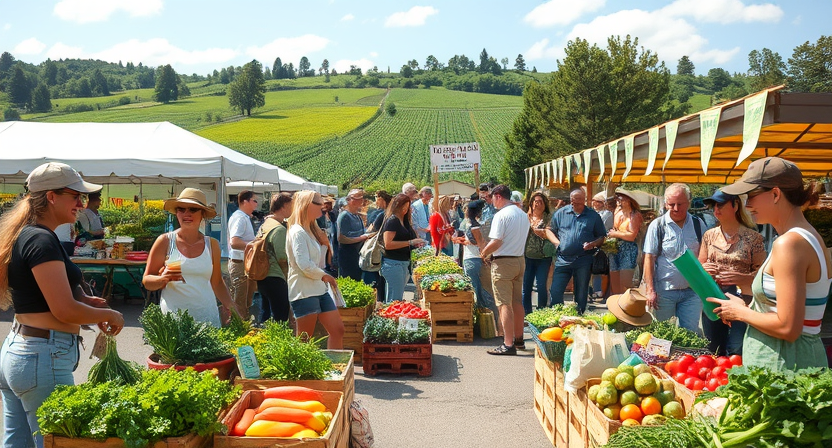Benefits of Supporting Local Farmers Markets

Supporting local farmers markets provides a direct avenue for consumers to access fresh, seasonal produce. By purchasing fruits and vegetables that are grown nearby, individuals can enjoy products that are at their peak freshness and nutritional value. This not only benefits the consumer’s health but also supports the local farmers in their livelihood.
In addition, shopping at local farmers markets contributes to the reduction of food miles, which helps minimize the carbon footprint associated with transporting food over long distances. By choosing locally-produced goods, consumers can play a role in environmental conservation efforts and promote sustainability within their community. Furthermore, by engaging in direct transactions with farmers, individuals can foster relationships with food producers and gain a deeper appreciation for the hard work and dedication that goes into growing the food that nourishes them.
Reduction of Food Miles

Supporting local farmers markets significantly reduces the distance that food travels from farm to plate. By sourcing produce, dairy, and meats locally, consumers can decrease the carbon footprint associated with transportation and distribution. This reduction in food miles helps lower greenhouse gas emissions and contributes to a more sustainable food system.
Choosing locally grown and produced foods not only supports the environment but also ensures fresher and more nutritious options for consumers. By cutting down on the time it takes for food to reach the consumer, local markets offer produce at its peak ripeness and flavor, promoting healthier eating habits and a deeper connection to the origins of our food.
Promotion of Sustainable Agriculture Practices

When you support local farmers markets, you are actively promoting sustainable agriculture practices. Sustainable agriculture focuses on techniques that are environmentally friendly, economically viable, and socially just. By purchasing produce directly from local farmers, you are contributing to the preservation of the land, reducing the need for harmful pesticides and chemicals, and supporting farming methods that prioritize the long-term health of the soil.
Additionally, by engaging with local farmers who practice sustainable agriculture, you are helping to foster a more resilient food system. These farmers often employ crop rotation, use natural fertilizers, and prioritize biodiversity on their land, which helps to improve soil health and reduce the reliance on synthetic inputs. By supporting these practices, you are not only ensuring the availability of fresh and nutritious food for future generations but also contributing to the overall health of the planet.
Support for Small-Scale Farmers

Small-scale farmers play a crucial role in our local communities by providing fresh, high-quality produce that is often unique to their small operations. These farmers are dedicated to practicing sustainable agricultural methods, taking care of the land and ensuring the long-term health of their crops. By supporting these small-scale farmers at local markets, consumers can directly contribute to the preservation of traditional farming practices and the protection of biodiversity.
Furthermore, buying from small-scale farmers promotes a more equitable food system, as it allows these producers to receive fair prices for their products and continue their agricultural livelihoods. This support not only helps to bolster the local economy but also fosters a deeper connection between consumers and the food they eat, encouraging a sense of appreciation for the hard work and dedication of those who grow our food.
Preservation of Farmland

The presence of local farmers’ markets plays a crucial role in preserving farmland within communities. By providing a direct avenue for farmers to sell their produce, these markets contribute to the financial viability of farming operations, thus reducing the pressure to sell farmland to property developers. This preservation of farmland helps maintain the agricultural landscape and prevents urban sprawl from encroaching on valuable agricultural spaces.
Furthermore, supporting local farmers’ markets encourages consumers to understand and appreciate the importance of farmland in sustaining food production. By witnessing the hard work and dedication of local farmers firsthand, individuals gain a deeper connection to the land and a greater respect for the agricultural heritage of their region. This awareness fosters a sense of responsibility in preserving farmland for future generations and ensures that farming remains a viable and respected profession within the community.
Encouragement of Biodiversity

The support of local farmers markets plays a vital role in fostering biodiversity within our ecosystems. By purchasing products directly from small-scale farmers who prioritize sustainable agricultural practices, consumers help promote the cultivation of a diverse range of crops. This diversity is essential for maintaining healthy soil, plant, and animal populations within agricultural landscapes, ultimately contributing to the overall health of our environment.
Furthermore, by choosing to buy from local farmers markets, individuals are encouraging the preservation of heirloom varieties and traditional farming methods that may not be economically viable on a larger scale. This preservation of diverse plant and animal species helps safeguard genetic diversity and ensures that culturally significant crops and livestock breeds are not lost over time. As consumers actively support these practices, they are actively participating in the conservation of biodiversity and the continuation of rich agricultural traditions.
Reduction of Packaging Waste

One significant advantage of supporting local farmers markets is the reduction of packaging waste. When you purchase directly from farmers, you often find that the produce is presented with minimal or no packaging at all. This contrasts with the excessive packaging commonly found in supermarkets, where every fruit and vegetable is individually wrapped in plastic or placed in styrofoam trays, contributing to the growing crisis of plastic pollution.
By opting to shop at farmers markets, consumers can play a part in reducing the amount of single-use packaging that ends up in landfills or pollutes our oceans. This simple choice not only helps to lessen the environmental impact of our food consumption but also encourages a shift towards more sustainable and eco-friendly packaging practices overall.
Access to Fresh, Seasonal Produce

Farmers markets offer a wide array of fresh fruits and vegetables that are in season, providing customers with the opportunity to enjoy produce at its peak flavor and nutritional value. By purchasing locally grown fruits and vegetables, consumers can savor the taste of freshly harvested goods that are often picked at their ripest state, offering a delightful burst of flavors that are unmatched by their supermarket counterparts. These seasonal offerings not only taste better but also contain higher levels of essential vitamins and minerals compared to produce that is transported long distances and stored for extended periods.
Furthermore, access to fresh, seasonal produce at farmers markets encourages individuals to explore a variety of fruits and vegetables that they may not typically encounter in their regular grocery store. This exposure to diverse and unique offerings can broaden one’s culinary horizons, inspiring creativity in the kitchen and fostering a greater appreciation for the vast array of produce that nature has to offer. By supporting local farmers markets, consumers not only nourish their bodies with fresh, high-quality fruits and vegetables but also embark on a culinary adventure that celebrates the flavors of each season.
Creation of a Stronger Sense of Community

Farmers markets play a pivotal role in fostering a stronger sense of community by bringing together individuals from all walks of life in a shared space. As people gather to peruse the stalls of fresh, locally-sourced produce, a sense of camaraderie emerges, creating connections between vendors and customers alike. Moreover, the collaborative atmosphere encourages conversations about food, sustainability, and local initiatives, further strengthening the bonds within the community.
In addition to fostering connections between individuals, farmers markets also provide a platform for local artisans, musicians, and small businesses to showcase their talents and products. By incorporating various aspects of the community into one cohesive event, these markets serve as a hub of activity where people can engage with their neighbors, support local entrepreneurs, and celebrate the unique offerings of their region. This collective gathering not only promotes a sense of unity but also highlights the diverse skills and talents that make each community distinct.
Boost to Local Economy

One of the significant advantages of supporting local farmers’ markets is the boost it provides to the local economy. By buying directly from farmers and small-scale producers, consumers keep money circulating within the community. This economic injection helps in creating jobs, supporting local businesses, and stimulating economic growth in the region.
Furthermore, when individuals choose to purchase from local farmers’ markets, they are contributing to the overall prosperity of the area. The money spent at these markets often stays within the community, benefiting not only the farmers themselves but also other local businesses that the farmers may frequent. As a result, a cycle of economic support is created, leading to a more financially stable and thriving local economy.
Education on Where Food Comes From

One key benefit of supporting local farmers markets is the opportunity for consumers to gain a deeper understanding of where their food comes from. Many shoppers are disconnected from the sources of their food due to the industrialized nature of the food system. By interacting with farmers and food producers directly at these markets, individuals can learn about the origins of their food, the farming methods used, and the journey their produce takes from farm to table.
This educational aspect not only increases awareness about the food production process but also fosters a sense of appreciation for the effort and hard work that goes into growing and cultivating fresh, seasonal produce. As consumers become more informed about the origins of their food, they are better equipped to make conscious and sustainable food choices that support local agriculture and promote a healthier lifestyle. By engaging with farmers markets, individuals can develop a more profound connection to their food and the people who produce it, enhancing their overall relationship with food and nutrition.
Reduction of Carbon Emissions

One of the significant benefits of supporting local farmers markets is the positive impact it can have on reducing carbon emissions. By purchasing produce that is grown closer to home, the need for long-distance transportation is minimized. This means fewer trucks on the road burning fossil fuels and releasing harmful greenhouse gases into the atmosphere.
Additionally, supporting local farmers markets can help lower the carbon footprint associated with the storage and processing of food. When fruits and vegetables are sourced locally, there is less reliance on energy-intensive methods of preservation and refrigeration that contribute to carbon emissions. By choosing to buy from local farmers, consumers can play a role in combating climate change and promoting a more sustainable food system.
Support for Family-Owned Businesses

Family-owned businesses play a crucial role in the local economy, often serving as the backbone of many communities. By supporting these enterprises, consumers contribute directly to the livelihood of families in their neighborhood. The success of family-owned businesses not only sustains the owners but also creates opportunities for employment within the community.
Furthermore, family-owned businesses tend to prioritize quality and customer service over mass production and impersonal transactions. This commitment to excellence fosters a sense of trust and loyalty between the business and its customers, leading to long-lasting relationships. By choosing to support family-owned establishments, consumers can experience a more personalized shopping experience while knowing that their patronage directly benefits individuals within their community.
Promotion of Healthier Eating Habits

When individuals frequent local farmers markets, they are provided with an abundance of fresh fruits and vegetables that are rich in essential nutrients. These whole foods are inherently healthier options compared to processed and packaged foods commonly found in supermarkets. By incorporating more fresh produce into their diets, people can improve their overall health and well-being.
Furthermore, supporting local farmers markets encourages a greater consumption of seasonal fruits and vegetables. Eating produce that is in-season not only enhances the flavor and quality of the food but also ensures that individuals are consuming a diverse range of nutrients throughout the year. This practice promotes a diet that is in harmony with the natural growing cycles of plants, offering a variety of health benefits and supporting a more balanced and nutritious way of eating.
Fostering of Relationships with Food Producers

Local farmers markets offer a unique opportunity for consumers to directly connect with the people who grow their food. By fostering relationships with food producers, individuals can gain a deeper understanding and appreciation for the hard work and dedication that goes into producing fresh, seasonal produce. This direct interaction allows for transparency in the food production process, creating a sense of trust between farmers and consumers.
Building relationships with food producers not only benefits consumers but also provides support and encouragement to local farmers. By establishing a connection with the people who grow their food, consumers can show appreciation for the agricultural practices that sustainably produce high-quality products. This mutual respect and collaboration fostered at farmers markets contribute to the preservation of food traditions and the continuation of small-scale farming practices that promote environmental sustainability.
Preservation of Food Traditions

Preservation of food traditions is a vital aspect of maintaining cultural heritage and identity within communities. Through supporting local farmers markets and purchasing traditional foods, individuals can help ensure that culinary practices passed down through generations continue to thrive. These food traditions not only provide a sense of connection to the past but also allow for the celebration of unique flavors and cooking techniques that define a region’s culinary landscape.
By actively participating in the preservation of food traditions, consumers can play a role in safeguarding the stories and histories tied to different dishes and ingredients. Whether it’s savoring a family recipe made with locally sourced produce or learning about the cultural significance of a particular cooking method, engaging with traditional foods fosters a deeper appreciation for the rich tapestry of culinary customs that contribute to a community’s cultural tapestry.
Opportunity to Discover Unique and Specialty Products

In addition to supporting local farmers and enjoying fresh produce, shopping at farmers markets offers the opportunity to discover unique and specialty products that are not commonly found in regular grocery stores. From artisanal cheeses and homemade jams to handcrafted soaps and specialty baked goods, farmers markets showcase a diverse range of offerings that cater to various tastes and preferences.
Exploring the stalls at a farmers market can lead to exciting culinary discoveries and provide a chance to sample new flavors and ingredients. Whether you are seeking out organic herb blends, heirloom vegetables, or small-batch chocolates, these markets often feature products that are crafted with care and attention to detail, adding a special touch to your meals and enhancing your overall cooking and dining experience.
Contribution to Food Security

In times of uncertainty and global challenges, ensuring food security becomes a crucial aspect of community resilience. By engaging with local farmers markets and supporting small-scale farmers, individuals and communities can take proactive steps towards securing a stable and reliable food source. These markets provide access to fresh, seasonal produce that is grown locally, reducing dependency on imported goods and increasing food self-sufficiency.
Moreover, by investing in and promoting sustainable agriculture practices through these markets, we can safeguard our food sources for the future. Supporting initiatives that prioritize biodiversity, conservation of farmland, and reduced carbon emissions not only benefits the environment but also contributes to long-term food security. Through these collective efforts, local farmers markets play a vital role in building a resilient food system that can withstand challenges and disruptions, ultimately ensuring that communities have access to nourishing and diverse food options.
Creation of Jobs in the Local Area

Supporting local farmers markets leads to the creation of jobs in the local area by providing opportunities for individuals to work in various aspects of the market operations. From setting up stalls to managing sales transactions, there is a diverse range of job roles that contribute to the smooth functioning of the market and support the local economy. Additionally, the demand for locally produced goods can lead to an increase in employment opportunities for farmers, producers, and artisans who supply their products to the markets.
The presence of farmers markets not only creates direct job opportunities within the market itself but also generates indirect employment in related sectors such as transportation, packaging, and marketing. The need to transport goods from farms to markets, package products for sale, and promote market events can result in the creation of jobs that support the entire local food ecosystem. By fostering a thriving marketplace for local goods, farmers markets play a significant role in job creation and economic growth within the local community.
Encouragement of Social Interaction and Connection

Local farmers markets provide a valuable space for fostering social connections within communities. As shoppers peruse the stalls, they have the opportunity to engage in conversations with farmers, artisans, and other local vendors. These interactions not only strengthen relationships between producers and consumers but also create a sense of belonging and shared community values.
Additionally, farmers markets serve as a gathering place where friends and neighbors can come together to enjoy the bustling atmosphere and support local businesses. The mix of people from diverse backgrounds coming together to appreciate fresh, seasonal produce fosters a sense of unity and camaraderie. By promoting these social interactions, farmers markets play a vital role in building stronger communities and enhancing the overall well-being of individuals.
• Farmers markets provide a space for engaging conversations between shoppers and vendors
• Interactions at farmers markets strengthen relationships and create a sense of community
• Local markets serve as a gathering place for friends and neighbors to support local businesses
• Diverse backgrounds coming together at farmers markets fosters unity and camaraderie
• Social interactions at farmers markets contribute to building stronger communities and enhancing individual well-being




